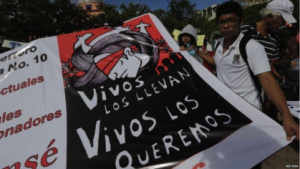Protests over the disappearance of 43 students spread from Iguala to Mexico City, calling for an accelerated government investigation and the demise of the President, Enrique Peña Neito.
On September 26, students from the Raúl Isidro Burgos College at Ayotzinapa, Mexico traveled by bus to the nearby city of Iguala. There, Mayor José Luis Abarca’s wife, Maria de los Angeles Pineda Villa, had organized a celebratory evening for her charitable contributions. The Ayotzinapa students intended to use the event as a platform to protest discriminatory hiring practices and to demand transportation funds to travel to the capital.
Allegedly acting on the orders of the mayor, who feared that the students would disrupt the events, state police working with the local gang and drug cartel, the Guerreros Unidos, intercepted the bus. The officers opened fire, resulting in the deaths of three students and three passers-bys, with 17 others injured. Police officers claim that about 30 to 40 were able to escape, and that the remaining students were then transferred to the Guerreros Unidos.
Abarca and Pineda were arrested by the federal police on November 4 and charged of organized crime, kidnapping, and murder, but still await prosecution.
A mass grave speculated to contain the bodies of the missing students was shortly discovered about an hour away from the city of Iguala, but initial tests revealed that these were not the students. Similar graves throughout the Guerrero state have been uncovered. The government is presently examining tests of the badly burnt remains. Some evidence has also been transported to Austria for forensic investigation.
Approximately 53 further suspects have been arrested for potential involvement with the disappearance of the students.
The delay in the prosecutions and the lack of results has led to popular unrest, beginning with protests from the families of the missing students. Demonstrators are not as concerned with the deaths of the six as much as the unresolved disappearance of the 43. Domestic discontent is directed at the federal government, who assumed responsibility determining the fate of the students on October 31 from state officials and have been been slow at performing this task.

Protestors perceive the federal government’s passivity and the municipal government’s corruption as a continuation of police brutality experienced under the preceding president Felipe Calderón’s “war on drugs.” According to the Human Rights Watch, the situation in Mexico is a “humanitarian crisis” since approximately 26 000 people have been reported missing since 2007. Protesters consequently appeal for the resignation of Peña Neito.
Protests spread to Mexico City on November 8 which began as peaceful but developed to include the burning of the ceremonial presidential palace by masked demonstrators. The largest demonstration on November 20 included the peaceful marching of tens of thousands of people dressed in black calling for justice. That same day, similar demonstrations were held across the country, some of which become violent.
Demonstrators were further fueled by the released information of the government’s title to a multimillion dollar home designed for the president, and Peña Nieto’s comments that the protests were part of a coup conspiracy to undermine the government.
Similar discontent for the government’s shortcomings has been expressed in the international platform, with the demonstrations of solidarity in major cities such as London, Washington, and Montreal. Most notably, the United Nations’ Office of the High Commission for Human Rights echoed concern for the continued disappearance of the students in late October, pressuring the Mexican police to increase its efforts to find the students.
On November 21, in an interview with the Latin American edition of Foreign Affairs, Uruguayan president José Mujica stated that Mexico was, “….a kind of failed state, in which public authorities have completely lost control.” He also claimed that “[Mexico was] devoured by the inside from drug trafficking.” The Uruguayan ambassador retracted the statement the following day, alleging solidarity with Mexico.




